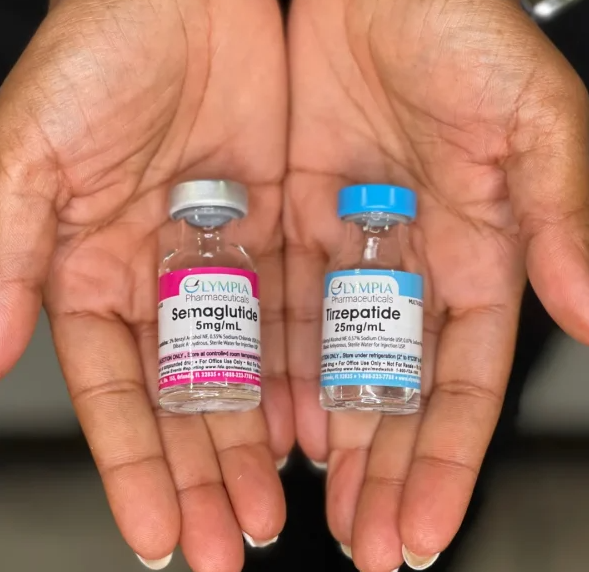Medical Weight Loss: A Comprehensive Guide to Ozempic, Wegovy, and Other GLP-1 Options
Dr. Karen Plymel, Functional Medicine Expert
GLP-1 Agonists for Medical Weight Loss: Safety, Efficacy, and Cost Considerations

In the ever-evolving landscape of weight loss treatments, GLP-1 agonists have garnered attention for their potential to help individuals manage obesity and related conditions. With increasing global obesity rates, finding effective weight management solutions has never been more critical. This article delves into the role of GLP-1 agonists in medical weight loss, their safety, efficacy, and cost considerations, as well as comparisons with other weight loss options.
What Are GLP-1 Agonists?
GLP-1 agonists, such as Ozempic and Wegovy, mimic the action of glucagon-like peptide-1 (GLP-1), a hormone naturally produced by the body. GLP-1 regulates appetite, glucose metabolism, and insulin secretion. By targeting GLP-1 receptors in the brain and pancreas, these medications effectively reduce appetite, increase satiety, and improve insulin sensitivity, which can contribute to significant weight loss.
Efficacy of GLP-1 Agonists for Weight Loss
GLP-1 agonists have demonstrated substantial efficacy in clinical trials for weight loss. By stimulating GLP-1 receptors in the brain, these medications reduce appetite and help individuals feel full with less food intake. They also slow gastric emptying, which further contributes to weight loss. In addition to weight reduction, GLP-1 agonists improve glycemic control in people with type 2 diabetes, making them a powerful tool for managing both weight and metabolic health.
Safety Considerations and Side Effects
GLP-1 agonists are generally well-tolerated, with common side effects including nausea, vomiting, and diarrhea, especially during the initial stages of treatment. While severe side effects, such as pancreatitis or thyroid cancer, are rare, it's important to consult with a healthcare provider before starting treatment, particularly for those with a history of these conditions. Long-term safety data is still under review, but current research suggests that the benefits of GLP-1 agonists often outweigh the risks for most patients.
Cost and Accessibility: Branded vs. Compounded Options
While branded GLP-1 agonists like Ozempic and Wegovy are effective, they can be costly. Compounded semaglutide, a more affordable option prepared by compounding pharmacies, offers a customizable alternative. This allows patients to potentially lower costs and tailor the formulation to their needs, though it's important to consult a healthcare provider before opting for compounded versions.
Other Medical Weight Loss Solutions
While GLP-1 agonists show promise, they are not the only weight loss medications available. Other options include:
- Contrave: A combination of bupropion and naltrexone that reduces appetite and cravings while increasing energy expenditure.
- Phentermine: A stimulant that suppresses appetite, typically used short-term in combination with lifestyle changes.
- Alli: An over-the-counter medication that inhibits fat absorption, helping individuals reduce calorie intake from fat-containing foods.
- Saxenda: A GLP-1 receptor agonist approved specifically for weight loss, functioning similarly to Ozempic and Wegovy but with an explicit focus on reducing food intake.
Comparing GLP-1 Agonists with Other Weight Loss Medications
GLP-1 agonists have the advantage of targeting both appetite regulation and glucose metabolism, making them especially effective for individuals with obesity and type 2 diabetes. However, individual responses to different medications can vary, so it’s essential to collaborate with healthcare providers to find the best treatment approach based on personal needs and medical history.
While GLP-1 agonists offer a promising avenue for weight loss, it's essential to explore other medical weight loss solutions to provide a comprehensive approach to managing obesity and related conditions. Here's an overview of some alternative options:
Contrave
Contrave is a combination medication containing bupropion and naltrexone. It works by reducing appetite and cravings while increasing energy expenditure, making it an effective option for individuals struggling with overeating and food addiction.
Phentermine
Phentermine is a stimulant medication that suppresses appetite by acting on the central nervous system. It is typically used as a short-term adjunct to lifestyle modifications for weight loss in individuals with obesity.
Alli
Alli is an over-the-counter medication containing orlistat, a lipase inhibitor that prevents the absorption of dietary fats. It can help individuals lose weight by reducing the number of calories absorbed from fat-containing foods.
Saxenda
Saxenda is a GLP-1 receptor agonist similar to Ozempic and Wegovy but is specifically approved for weight loss in individuals with obesity. It works by regulating appetite and slowing gastric emptying, leading to reduced food intake and weight loss.
Comparing Other Medical Weight Loss Options with GLP-1 Agonist Treatments
- While these medications offer various mechanisms of action for weight loss, GLP-1 agonists like Ozempic and Wegovy have the advantage of directly targeting appetite regulation and glucose metabolism, making them highly effective options for individuals with obesity and type 2 diabetes.
- However, individual responses to different weight loss medications can vary, and it's essential to work closely with healthcare providers to determine the most suitable treatment approach based on individual needs and medical history.
GLP-1 agonists are a class of medications designed to mimic the action of glucagon-like peptide-1 (GLP-1), a hormone naturally produced in the body. GLP-1 plays a crucial role in regulating appetite, glucose metabolism, and insulin secretion. By targeting GLP-1 receptors in the brain and pancreas, GLP-1 agonists exert their effects on weight loss and glycemic control.
Overview of GLP-1 Agonists:
- GLP-1 agonists work by stimulating GLP-1 receptors in the brain, leading to decreased appetite and increased feelings of fullness.
- In addition to their effects on appetite, GLP-1 agonists also slow down gastric emptying, which can further contribute to weight loss.
- These medications have been shown to improve glycemic control in individuals with type 2 diabetes, making them a valuable option for those with obesity-related metabolic disorders.
Comparison of Branded Options and Compounded Semaglutide
- Ozempic and Wegovy are branded GLP-1 agonists. These two branded agents are made by the same manufacturer and are essentially the same medication, with semaglutide as the active ingredient. Ozempic is indicated for glycemic control and cardiovascular risk reduction in patients with type II diabetes, while Wegovy is indicated for weight loss.
- Compounded semaglutide formulations offer a customizable alternative prepared by compounding pharmacies. This may provide a more cost-effective option for some individuals compared to branded options, as well as the option to customize formulations to include other peptides that may enhance the anti-inflammatory response.
- Additionally, tirzepetide (branded Mounjaro/Zepbound) is an emerging GLP-1 agonist with a dual mechanism of action that targets both the GLP-1 and GIP (glucose-dependent insulinotropic polypeptide) receptors. This dual action allows it to not only help with weight loss by suppressing appetite but also to assist in managing blood sugar levels, providing a broader approach to weight management. Just as Ozempic and Wegovy are essentially the same drug, Mounjaro and Zepbound have tirzepetide as the active ingredient in both agents, but with different indications.
- Ozempic/Wegovy, Mounjaro/Zepbound and compounded versions of both are given as once weekly injections.
Efficacy and Safety
- Clinical trials have demonstrated the efficacy of GLP-1 agonists in promoting weight loss and improving metabolic parameters.
- These medications are generally well-tolerated, with common side effects including nausea, vomiting, and diarrhea. However, severe adverse events can occur but are rare.
- Long-term safety data are still being studied, but current evidence suggests that GLP-1 agonists offer a favorable risk-benefit profile for most individuals.
- Before starting either medication, it's vital to discuss with your healthcare provider any potential risks, especially if you have a history of thyroid cancer, pancreatitis, or are pregnant or planning to become pregnant.
- All of these medications have interactions with other drugs, so providing a complete list of your current medications to your physician is essential.
Conclusion
GLP-1 agonists are a promising solution for weight loss, offering effective appetite suppression, improved glycemic control, and long-term weight management. With options like Ozempic, Wegovy, and compounded formulations, GLP-1 agonists provide flexibility and convenience for individuals seeking help with obesity and metabolic conditions. As with any medical treatment, it's important to consult with a healthcare provider to discuss risks, benefits, and the most suitable treatment for your specific needs.
In summary, GLP-1 agonists represent a promising option for medical weight loss, offering significant benefits in terms of appetite suppression, glycemic control, and weight reduction. Whether through branded options like Ozempic and Wegovy or compounded formulatio ns, GLP-1 agonists have the potential to make a meaningful impact on the lives of individuals struggling with obesity and related metabolic disorders.










